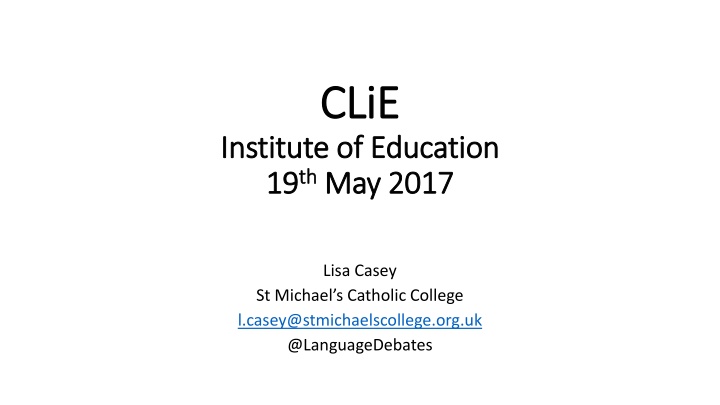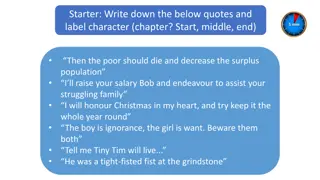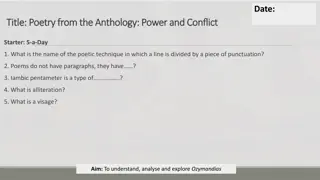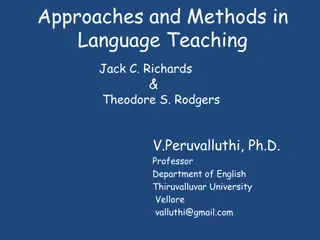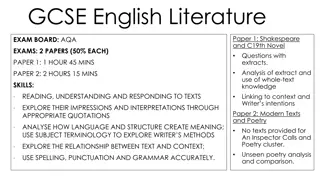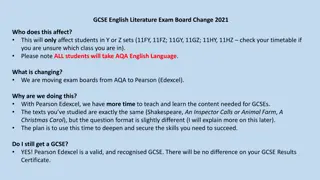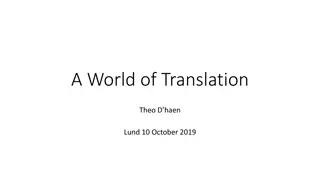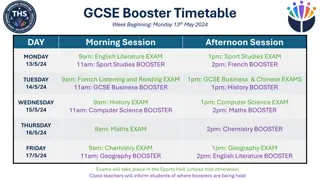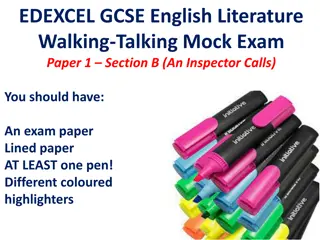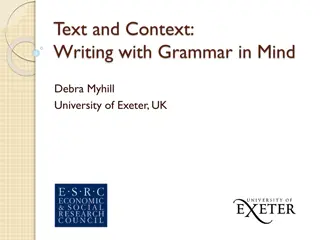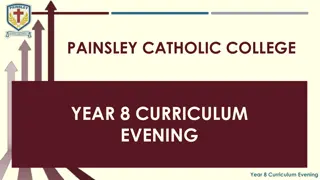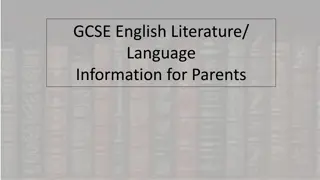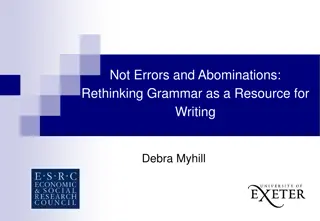Challenges in Teaching Grammar: GCSE and Literature Obstacles" (67 characters)
Challenges in teaching grammar, especially within the context of GCSE exams and literature studies. Discover the reluctance towards grammar teaching among secondary educators, the impact of exam structures, and the importance of adapting pedagogical approaches. Gain insights into the prevalent issues and considerations for effective grammar instruction.
Download Presentation

Please find below an Image/Link to download the presentation.
The content on the website is provided AS IS for your information and personal use only. It may not be sold, licensed, or shared on other websites without obtaining consent from the author.If you encounter any issues during the download, it is possible that the publisher has removed the file from their server.
You are allowed to download the files provided on this website for personal or commercial use, subject to the condition that they are used lawfully. All files are the property of their respective owners.
The content on the website is provided AS IS for your information and personal use only. It may not be sold, licensed, or shared on other websites without obtaining consent from the author.
E N D
Presentation Transcript
CLiE CLiE Institute of Education Institute of Education 19 19th thMay 2017 May 2017 Lisa Casey St Michael s Catholic College l.casey@stmichaelscollege.org.uk @LanguageDebates
KIPP MA Literature Graduate Language advocate TESOL Grammar Comprehensive SCITT
Challenges in teaching grammar in general (and EAL in particular). 1) GCSE is the primary driver of curriculum reform and change at KS3 and 4. Compounded by the small number of centres who offer English Language at A-level as a stand-alone subject. GCSE content is heavily biased towards a literary rather than linguistic approach. Little specialist terminology required outside of literary terminology. Little perceived need to tackle it.
English Literature Paper 2 English Language Paper 2 English Literature Paper 1 English Language Paper 1 1 hr 45 mins 1 hr 45 mins 2 hr 15 mins 1 hr 45 mins Section A (reading) You answer questions on two non-fiction texts. Section A (reading) You answer questions on an unseen piece of literary fiction. Section A You write an essay on a modern play. Section A You write an essay on Macbeth . Section B You write an essay comparing Power & Conflict poems. Section B (writing) You write a piece of writing to present an opinion/viewpoint. Section B You write an essay on Jekyll and Hyde . Section B (writing) You write a piece of descriptive or narrative writing. Section C You write about two unseen poems. 50% 50% 40% 60%
Example GCSE question from new exam Students read an extract of literary fiction and then Question 3: How has the writer structured the text to interest you as a reader? You could write about: what the writer focuses your attention on at the beginning how and why the writer changes this focus as the Source develops any other structural features that interest you.
Challenges in teaching grammar in general (and EAL in particular). 2.) Many secondary teachers are indifferent (or openly hostile!) to grammar teaching. Grammar teaching requires a pedagogical shift beyond just technical knowledge . Most are Literature graduates with little/no training in grammar. The KS2 SPAG tests are dry, decontextualized. Avoidance
Challenges in teaching grammar in general (and EAL in particular and EAL in particular). Not a specific issue unless brand new to English. In that case they are not considered the remit of the English Dept. In personal experience, they have better metalanguage than native speakers. No treated any differently to native speakers.
Is there an issue in parents attitude towards and lack of understanding of grammar? Not really. Parents have minimal conversations with staff about curriculum. When it does happen, it s usually about Literature text choices. They rarely see the difference between Literature and Language and so have a general sense of the subject but not specific.
How can universities support you and your team is dealing with the challenges you face in all these areas? Free training in schools. Include grammar training in teacher training (knowledge as well as how to deliver). Advice and resources on how to blend Literature and Language approaches in a non-threatening way. Provide cross-sector examples of dynamic and innovative grammar teaching in action. Provide some evidence that explicit grammar teaching impacts attainment positively.
* Expansive on history and genre with a view to KS4 and 5. Yr 7 English through the Ages *Capitalises on KS2 but moves beyond decontextualized training.
English through the Ages Uses the linguistic terminology to lead towards literary analysis. Looking at etymology, derivatives and affixation links directly to training on unseen vocab for 19th Century texts at GCSE and A- level content.
Fantasy writing English through the Ages Texting and slang 1
Focus: discourse structure, tone, narrative style. Year 8 Literature adverbial clause complement main clause object phrase sentence subject tense complex- compound, minor relative, subordinate noun phrase, adverbial phrase, prepositional phrase simple, complex, compound declarative, imperative, interrogative, exclamative semi-colon, colon For sarcasm past, present, continuous, perfect brackets, dashes for quotes, for speech Commas, speech marks 2
Vowel short long dipthong Consonant plosive fricative voiced Unvoiced nasal Beat boxing Poetry sound sensitivity Vowel
GCSE Form and function Technique Definition Example Noun a) Concrete A noun is a naming word. A name of a something you can see, hear, touch or smell. Names of ideas, qualities we cannot see, hear or touch. Needs a capital letter as the thing named is unique. A verb is an action word. For physical actions we can see. For mental/emotional actions. Shows levels of certainty. For metaphorical actions Adjectives modify/qualify nouns Comes before the noun being modified Comes after the noun being modified Compares the noun Is the strongest comparison word Dog Cup, chair, pen, mother, computer, poo beauty, strength, bravery, time Mars, Oxford University, Statue of Liberty a) Abstract a) proper Verb a) dynamic b) stative c) modal d) metaphorical Adjective a) pre-modifying b) post-modifying c) comparative d) superlative Write Run, leap, jump, sing, talk Love, believe, justify, want, be May, might, could, should, must, will He explodedwith rage. The big, white house sat on the hill. The old, dark room. The room was old and dark. It was older than mine. It was the oldest I has seen.
GCSE Form and function Sentence function But any good writer will tell you, that I pick the best sentence for the job I want them to do. You now need to look at why I picked these Sentence type tone / connotation sentences. 1. Choose the most stand out , effective sentences. 2. Say the effect of it, giving its grammatical name.
Lisa Casey St Michael s Catholic College l.casey@stmichaelscollege.org.uk @LanguageDebates
